
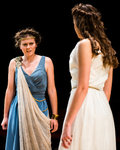
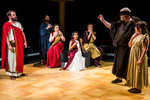
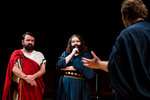

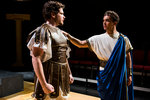
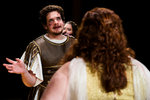
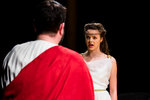

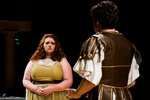
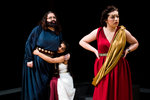
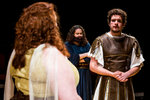
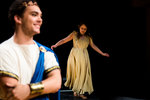
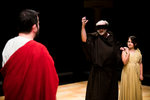
Last season, Centralia College Theatre brought stories to the stage meant to challenge and provoke audiences. In February, Isaac Wulff portrayed the emcee in Centralia College’s production of “Cabaret”, a study of the slow infiltration of Nazi propaganda into Germany that was as visually stunning as it was gut wrenching.
In the same way that show taught hard lessons, Wulff is hoping his production of “Antigone”, opening tomorrow in the Wickstrom Studio Theatre, will also challenge audiences to think about deeper questions.
“The unfortunate thing about hard lessons is we are most responsive to them if they are coupled with pain,” Wulff said. “It’s nice to package the lesson with a couple of yuks but if you give them a twist of the knife, it’s a little easier to remember.”
The Greek tragedy “Antigone” by Sophocles tells the story of Antigone (portrayed by Shea Bolton) who defies the law of her state by burying her brother’s body in the aftermath of a civil war. King Creon (portrayed by Matt Osborne) must decide whether or not to put Antigone to death for her transgressions.
“It’s the question of what’s the difference between law and justice and how they can be confused to our peril?” Wulff said.
Creon decides to follow the law and have Antigone put to death, despite the fact that he is surrounded by counselors, including the Fates themselves, urging him to choose another path.
“You see all through history and right up to the present day how people can come to believe, especially people in power, they are the sole arbitrators of right and wrong,” said Tom Lockhart, who portrays the blind soothsayer, Tiresias, one of the counselors urging Creon to reconsider.
Equally unyielding is the character of Antigone. Her sister, Ismene, (portrayed by McKayla Dawes) agrees with Antigone’s principals but attempts to convince her not to defy Creon’s orders. The young, headstrong Antigone is willing to die for what she believes is right.
“I really admire how strong Antigone is,” Bolton said. “She’s the strongest character. While being stubborn, she’s unyielding. She’s not sacrificing her beliefs for anything.”
Like Creon, many in power have made decisions before fully considering the possible outcomes. Creon is a man who values social and political order. He believes Antigone should die because she has broken the law but he is putting a woman to death for doing no more than practicing her religion.
“I think he understands what he has done and he accepts it,” Osborne said. “I think he learns his lesson and he tries to get people to forgive him but there’s no one left to do it.”
Wulff said when he was asked by Centralia College Theatre head Emmy Kreilkamp to direct a play this year, he suggested Antigone partially because of his love of the classics but also because of this particular translation he had found by Richard Emil Braun. Wulff said sometimes Greek classics are translated into modern language that makes them sound to the ear less like what he truly believes was intended by the original writers.
“Greek plays were poetry but it wasn’t like Shakespeare, it was like slam poetry,” Wulff said. “This is translated by Greek experts who are also poets and I just really like the flow of it.”
The show will be presented in the round, with the audience seated on the same level as the actors and actresses. The sparse stage will be a square and painted like sand to look like a town square in Ancient Greece.
“We’re really treating the crowd as part of the citizens of Thebes,” Wulff said. “Creon will speak directly to them, possibly shake a few hands and kiss a few babies, after all he’s a politician … One of the things I love about theatre in the round is you can see the people on the other side of the stage. You’re not just seeing what’s happening on stage, you can see the other people who are watching and their reactions are part of the story.”
Centralia College’s production of “Antigone” is appropriate for most audiences but Wulff did caution that the story is a tragedy and the themes could be challenging, though not impossible, for younger teens to understand and absorb.